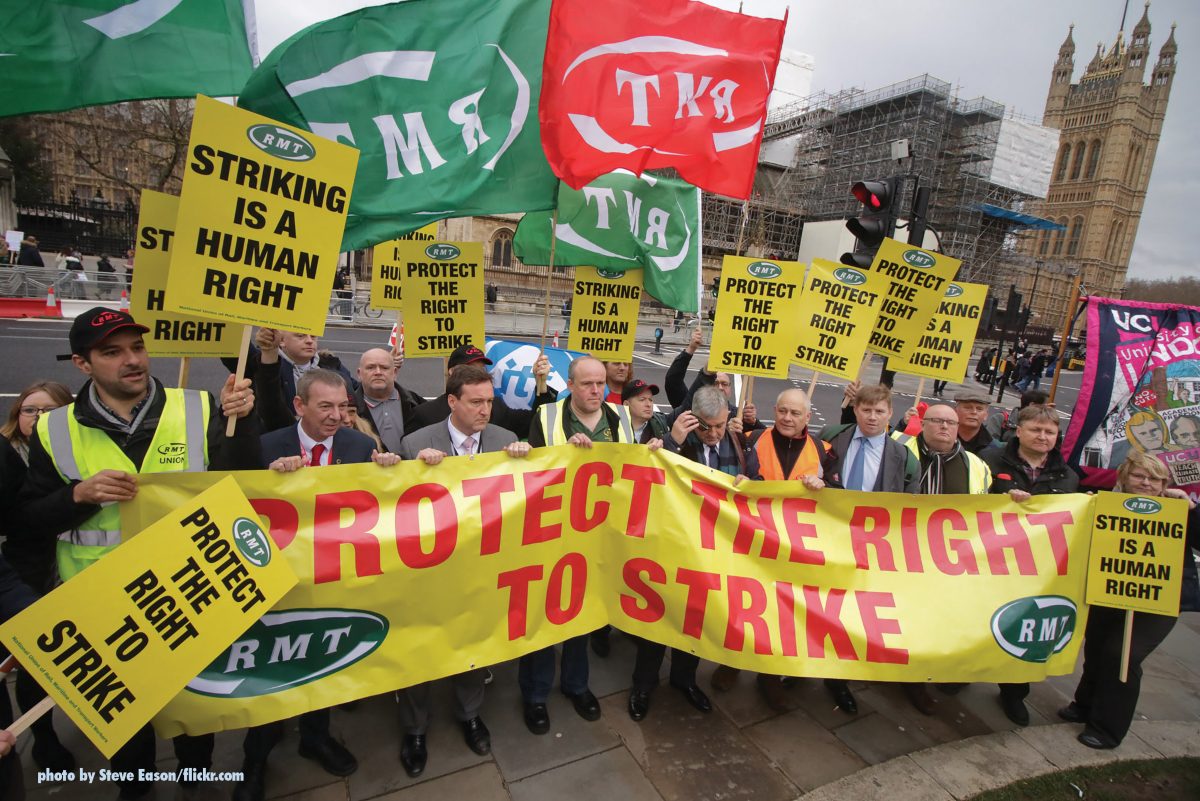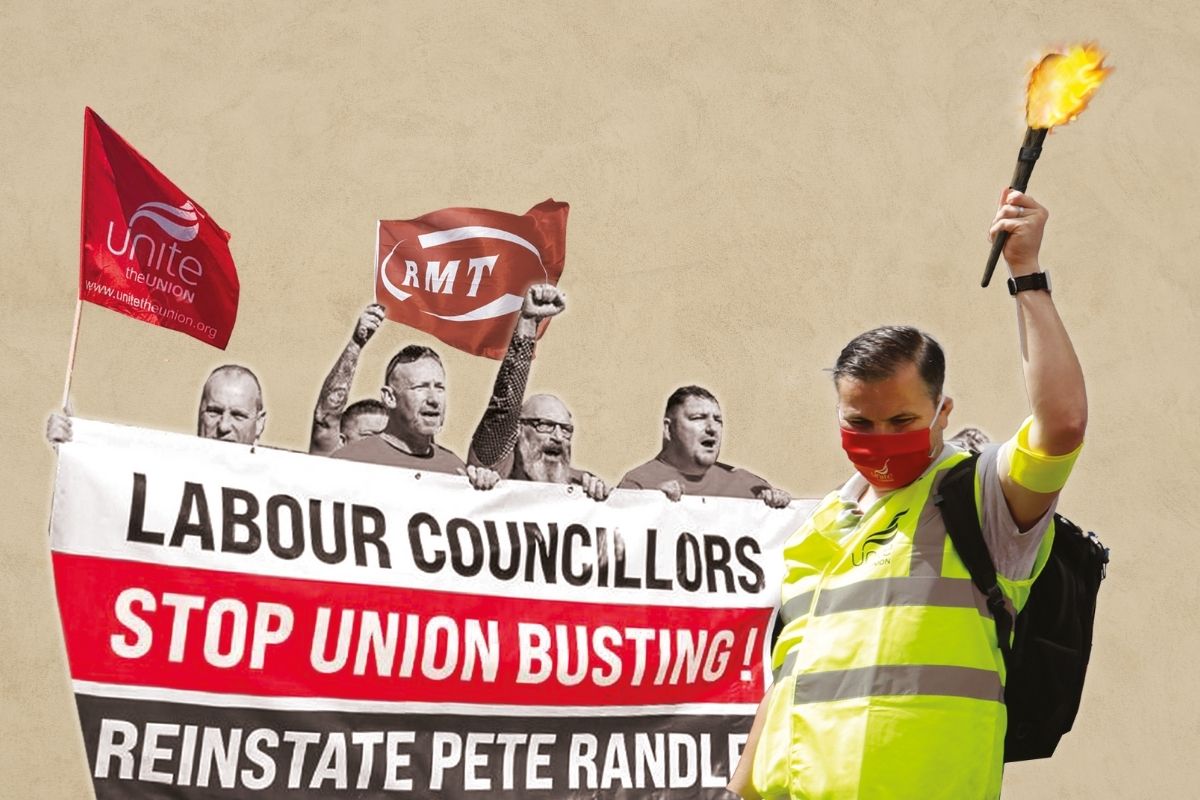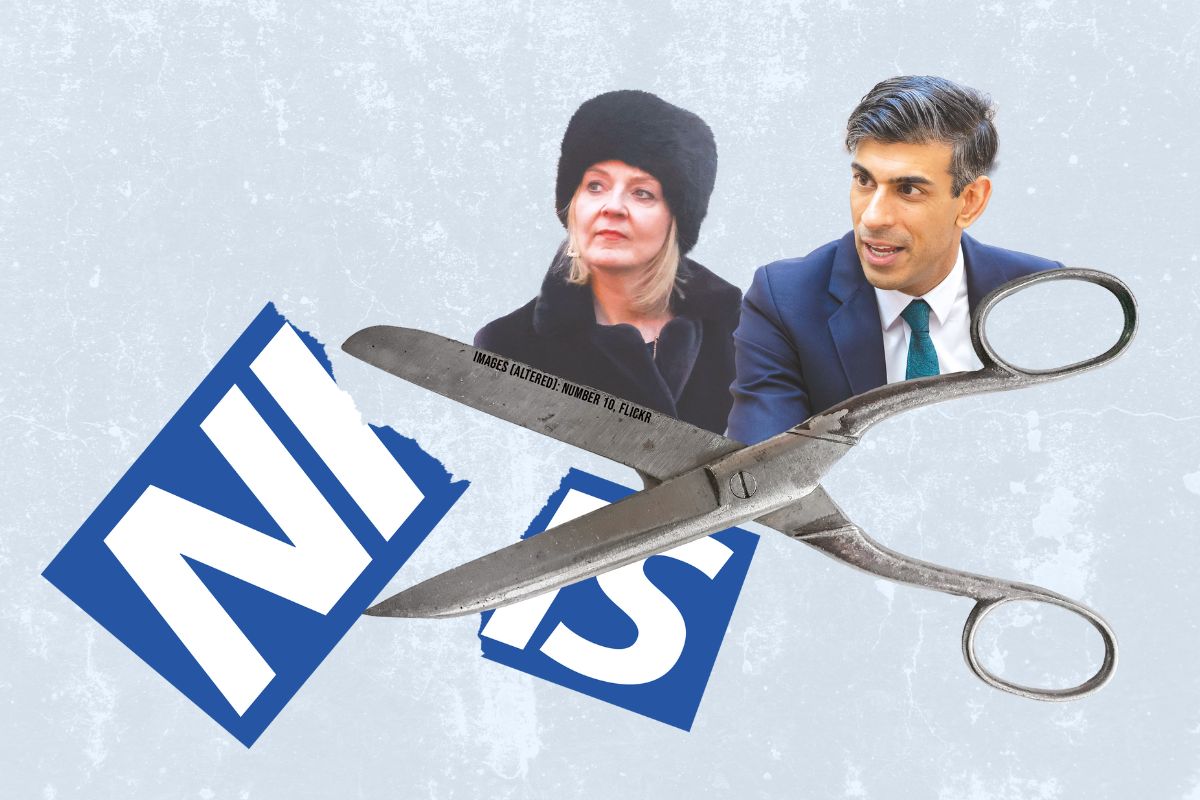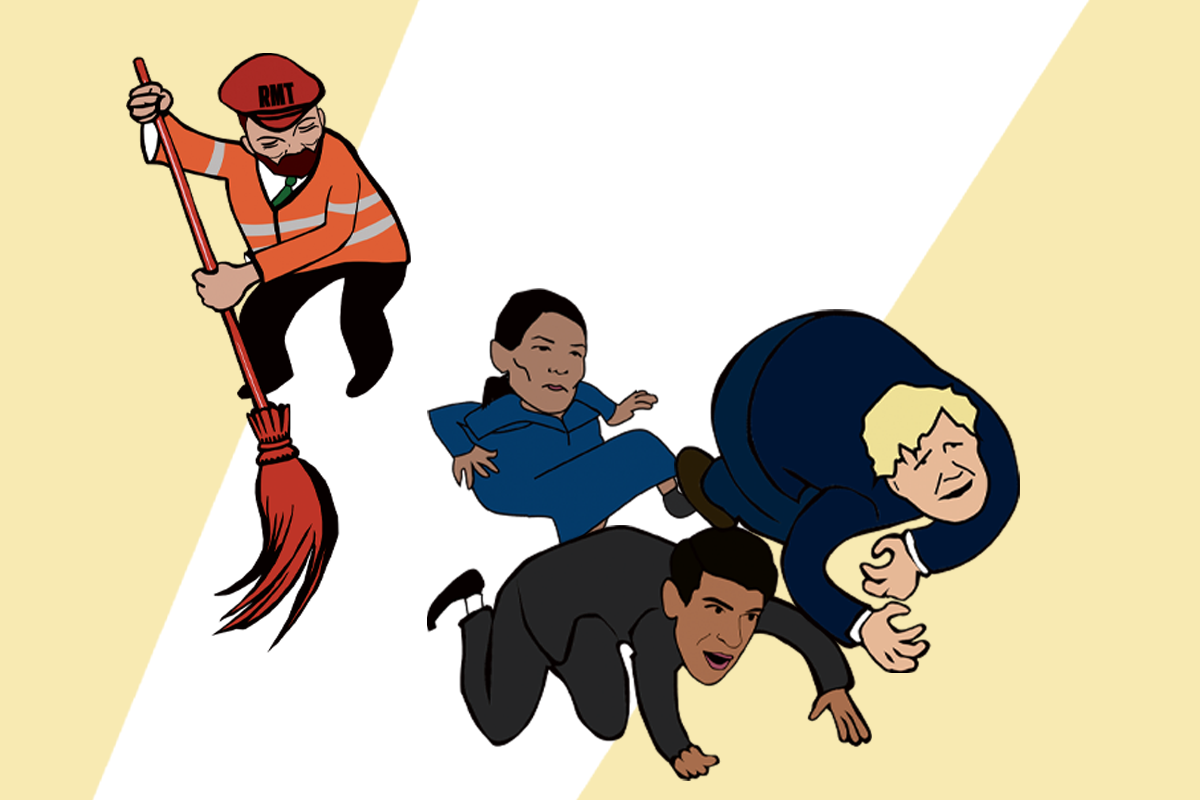In her bid to become the next Tory leader and PM, Liz Truss has pledged to bring in a host of new anti-union legislation. Trade union leaders have responded defiantly. This must be matched with militant struggle and bold united action.
Today, tens of thousands of rail workers – organised in the RMT and TSSA unions – are once again out on strike, in an ongoing national dispute over jobs, pay, and conditions.
RMT leaders have rejected the measly offer presented by rail bosses. Not only does this fail to match the rate of inflation, which is already (officially) at 9.4%, and which is set to rise even further this autumn; but it also insists upon a raft of changes that would undermine the safety of passengers and workers alike.
Scandalously, but unsurprisingly, National Rail CEO Andrew Haines has attempted to blame the RMT for the stalemate in negotiations, and the resultant strike action taking place today, with more to come in the weeks ahead.
Speaking to the BBC, Haines asserted that the union was “hell bent on continuing their political campaigning, rather than compromising”.
If anyone is using this dispute as a means of “political campaigning”, however, it is the Tories.
Clowns and charlatans
As predicted, the Tory leadership contest has rapidly descended into a shouting match between the final two candidates, Rishi Sunak and Liz Truss.
the Tory leadership contest has rapidly descended into a shouting match between the final two candidates, Rishi Sunak and Liz Truss.
Those hoping to succeed Boris Johnson are viciously competing to see who can offer the sharpest tax cuts; who can take the hardest line against the EU, China, and Russia; and who can do the best impression of their political idol, Margaret Thatcher.
Sunak is clearly the desired candidate of the ruling class; a so-called ‘moderate’, ‘sensible’ voice within a party that has been taken over by a chorus of clowns, crooks, and charlatans.
In order to win, however, the former chancellor must appeal not to the City of London and big business, but to the rabid reactionary rabble that makes up the 160,000-strong Tory Party membership.
And right now, after one-and-a-half televised debates between them, it seems that Sunak is lagging far behind his opponent when it comes to support amongst the frothing Conservative ranks.
According to one recent YouGov poll, for example, Truss leads Sunak by 62% to 38% amongst Tory members.
Irreparable damage
 The ruling class are growing increasingly concerned at where all of this is heading. Having turned on Johnson and helped to push him out of Number 10, the establishment now faces the prospect of his even more unhinged, reckless, self-seeking acolyte taking his place as prime minister.
The ruling class are growing increasingly concerned at where all of this is heading. Having turned on Johnson and helped to push him out of Number 10, the establishment now faces the prospect of his even more unhinged, reckless, self-seeking acolyte taking his place as prime minister.
Senior Tory figures, meanwhile, are terrified that the race to replace Johnson could consume the party in the process.
In their effort to win the support of the Tory rank and file, Sunak and Truss have pulled off the gloves and let rip into one another. No holds are barred, it seems, as these leadership hopefuls fight it out.
The real knockout blow, Tory MPs worry, will not be to either of these rival candidates’ bids to be the next PM, but to the Conservative Party’s hopes of winning the next election.
“It’s more toxic than I’ve ever seen,” exclaimed an exasperated Amanda Milling, Foreign Office minister and former chair of the party.
Similarly, headlines in the Telegraph, a consistent Conservative mouthpiece, warned that “infighting will wreck the Tories’ reputation”. Both leadership contestants, the paper’s editorial firmly stated, “need to beware irreparably damaging the Tory record in office”.
Bonfire of rights
 With Sunak snapping at her heels, the shameless, opportunistic Liz Truss is doubling-down on her deranged promises and hysterical rhetoric.
With Sunak snapping at her heels, the shameless, opportunistic Liz Truss is doubling-down on her deranged promises and hysterical rhetoric.
As part of this farcical spectacle, the foreign secretary has now aimed her fire on the trade unions, with a pledge to alight a bonfire of workers’ rights within 30 days of taking office.
Amongst the many anti-union ‘reforms’ proposed by Truss are plans to: legally guarantee a minimum service in vital industries, including transport, effectively outlawing strikes in these sectors; raise existing voting thresholds in strike ballots; limit the mandate provided by a successful vote for action; and increase the minimum notice period for any walkout from two to four weeks.
This all comes on top of the ‘scab charter’ recently introduced by the Tories – new legislation that allows the bosses to employ striking workers with agency labour.
“We need tough and decisive action to limit trade unions’ ability to paralyse our economy,” proclaimed Truss, hoping to emulate Thatcher and her confrontation with the miners and other organised workers.
“I will do everything in my power to make sure that militant action from trade unions can no longer cripple the vital services that hard-working people rely on,” the prospective Tory leader continued, in a nod to her audience of fanatical Conservative members and callous bosses.
Class war
This provocative move has already been met with a defiant response from the trade union leaders.
“Liz Truss has declared war on the trade union movement and working people,” stated Unite general secretary Sharon Graham on Twitter. “Let’s be clear, her mad-cap proposals are an attempt to all but ban strike action and outlaw effective trade unions.”
“This manifesto is nothing but a charter of discontent,” Graham continued. “The rights of working people have been put on the chopping block by an ambitious politician, hawking for the votes of a tiny minority.”
“Unite the Union will not bow to threats,” the Unite leader firmly concluded, before adding that “any attempt to place us outside of the law will be met with fierce, prolonged resistance”.
.@trussliz has declared war on the trade union movement and working people.
Let’s be clear, her mad-cap proposals are an attempt to all but ban strike action and outlaw effective trade unions. 1/4— Sharon Graham (@UniteSharon) July 26, 2022
Similarly, replying to Truss’ inflammatory suggestions, RMT general secretary Mick Lynch stated that:
“These proposals amount to the biggest attack on trade union and civil rights since labour unions were legalised in 1871.
“Truss is proposing to make effective trade unionism illegal in Britain and to rob working people of a key democratic right.”
Notably, Lynch concluded by warning that:
“If these proposals become law, there will be the biggest resistance mounted by the entire trade union movement, rivalling the general strike of 1926, the Suffragettes and Chartism.”
This is exactly what is needed in response to Truss’ declarations of class war.
Fight fire with fire
 Truss may be motivated by her own egotistical, careerist interests. But it is clear that, in this case, her tub-thumping is giving a voice to the ruthless desires of the bosses.
Truss may be motivated by her own egotistical, careerist interests. But it is clear that, in this case, her tub-thumping is giving a voice to the ruthless desires of the bosses.
From the ‘jobs massacre’ at P&O; to the wave of ‘fire and rehire’ mass sackings that have taken place across the economy: the bosses are on the offensive everywhere, looking to secure and boost their profits at the expense of workers’ wages and conditions.
In the face of this onslaught, a militant fightback is required to defend trade union freedoms and workers’ rights. And as Graham and Lynch have hinted at, this means organising to smash through any anti-union legislation and regulation that is put in place to prevent workers from taking action.
The bosses – at P&O Ferries and elsewhere – have shown that they are willing to break the law to protect their interests. Organised workers must be willing to take similarly bold steps to protect theirs. We must fight fire with fire.
Mick Lynch is 100% right, in this respect, to point to the 1926 general strike and the heroic struggle of the Chartists for inspiration.
The hardest wing of the Chartists were determined class fighters, who were willing to go beyond the boundaries of bourgeois law in order to win their demands. This is the real legacy of Chartism that the trade union movement must learn from today.
Government of crisis
 The bosses and Tories have thrown down the gauntlet. But they are doing so not from a position of strength, but of weakness.
The bosses and Tories have thrown down the gauntlet. But they are doing so not from a position of strength, but of weakness.
If, as expected, Truss wins the Tory leadership race, she will enter Downing Street on the back of a summer strikewave, with workers beginning to gain confidence and flex their muscles.
These strikes, in turn, are likely to be the prelude to a greater tsunami of action in the autumn, with unions representing civil servants, teachers, and health workers all looking to ballot members in disputes over pay.
Today, members of the RMT union are out on strike, continuing their dispute with Network Rail over jobs, pay, and conditions. Our comrades have been down on the picket lines supporting the strikes from Southampton to Scarborough. pic.twitter.com/N6SGBxS7qZ
— Socialist Appeal (@socialist_app) July 27, 2022
At the same time, neither a Truss government nor a Sunak one would be ‘strong and stable’. Rather, it would be a government of crisis from day one, with the economy grinding to a halt, inflation raging, and splits in the Tory Party widening as British capitalism staggers from one crisis to the next.
The coming ‘winter of discontent’, therefore, will not be like that of 1978-79. Then, strikes were against an ailing Labour government, which paved the way for Thatcher to come to power.
Today, by contrast, workers are mobilising against a degenerate, rotten, weak Tory government – one that could be easily toppled if given enough of a push, just as the Heath government was brought down in 1974 by the threat of a mass strike by the miners.
Sweep them out!
 It is vital that the trade union leaders seize the opportunities in front of the movement. Across the board, workers are moving into action. The Tories, meanwhile, are in meltdown. It is time to sweep them all out.
It is vital that the trade union leaders seize the opportunities in front of the movement. Across the board, workers are moving into action. The Tories, meanwhile, are in meltdown. It is time to sweep them all out.
This means organising coordinated action across the unions to unite the struggles. This should include a one-day public sector strike, alongside demonstrations in every city and town, as part of a mass campaign to force a general election and give the Tories the boot.
Mick Lynch has already suggested such a move, raising the idea of a political general strike to turf out the Tories and stop any new anti-union legislation in its tracks. These bold words must now be translated into militant action.
Newspaper headlines: 'General strike threat' and fears of £3,850 energy bills https://t.co/NUgRxOUYSy
— BBC News (UK) (@BBCNews) July 27, 2022
At the same time, workers should have no illusions in the ‘alternative’ of a Starmer Labour government.
‘Sir’ Keir Starmer has made clear whose side he is on: punishing Labour MPs for standing with striking workers on picket lines; fawning over NATO and western imperialism; and outflanking the Tories when it comes to flag-waving and appeasing big business.
Instead, workers and youth must mobilise to overthrow this entire bankrupt system, and fight for a revolutionary socialist alternative to the misery and turmoil of capitalism.
Join the Marxists today to get organised and help us in this struggle.






